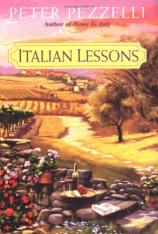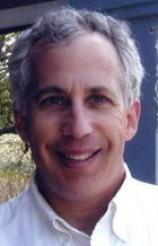Interview: October 12, 2007
October 12, 2007
Peter Pezzelli has made a name for himself writing poignant works of fiction about everyday Italian-American families, such as EVERY SUNDAY, FRANCESCA'S KITCHEN and HOME TO ITALY. In this interview with Bookreporter.com's Alexis Burling, Pezzelli explains what prompted him to write his latest book, ITALIAN LESSONS, and elaborates on the recurring theme of love's unpredictability, which is predominant in his work. He also discusses what he hopes readers will learn about life and love from his novels, recounts his bold decision to pursue a career as an author and shares what he thinks Americans can learn from Italian culture.
Bookreporter.com: What inspired you to write ITALIAN LESSONS?
Peter Pezzelli: I wanted to write a story about the power of reconciliation and forgiveness.
BRC: With a last name like Pezzelli, I am guessing you are of Italian heritage. Did you grow up in Italy or have you traveled there? Do you speak Italian, and if so, when and where did you learn the language?
PP: I was born and raised in Rhode Island. I do speak Italian, but it has been quite a while since I’ve been back to Italy, so I’m a little rusty. I first studied Italian in high school, and then after college I enrolled in a Berlitz course before traveling to Italy for the first time. During that trip, and others that followed, I spent a lot of time visiting some friends who live in a little out-of-the-way village where no one spoke any English. Immersed in Italian for all hours of the day and night, I learned a lot about the language.
BRC: Giancarlo runs into an ex-lover and fleetingly regrets not committing to her when he had the chance, although he is quite comfortable, for the most part, with the unadorned life he has led since they parted. "The simple life, he well understood, was one not always easily lived." What were your reasons for including this detail about Giancarlo? Did you think it might make him seem more human to your readers?
PP: When we meet Giancarlo, we find him living in a sort of self-imposed exile. He can’t escape it and move forward with his life because he’s holding on so tightly to the past, something we all do from time to time. I thought it was important to show the reader that deep inside, he understands that the way he is living is not the way things were meant to be for him. The trouble is that he just hasn’t learned yet how to break out of the prison he has built for himself.
BRC: Carter describes the reason why he's going to Italy to his friend Jimmy: "…It's like you can see your whole life opening up ahead of you, and you think maybe you should just go after her, just get on that bus and see where it takes you…" In your books, many of your characters seem to have these risk-taking, mind-expanding experiences. Has there been something in your life that you've gone after at all costs, instead of just merely letting it slip away, like Carter does with Elena? Is this why your characters are so adventure-prone?
PP: Not everybody can have a grand adventure like traveling to Italy, but I believe that the “mind-expanding experiences” that you speak of can happen in small ways in our everyday lives, in the choices we make on how to live our lives. For example, the life of Francesca in my second book, FRANCESCA'S KITCHEN, changes dramatically all because she decides to answer a help-wanted ad.
As for myself, perhaps the greatest risk I’ve ever taken is the one I took when I decided to walk away from a very comfortable career to pursue this crazy dream of becoming a novelist. Since I started down this path, there have been times when I’ve been beset by self-doubt and convinced that I’ve made an incredible blunder. But experiencing such moments is also part of any adventure. Mine is still unfolding.
BRC: On the other hand, Jimmy responds to Carter's plan by saying, "There are some things in life that you just can't have, no matter how good they look and how bad you want them, or think you need them… I don't worry about those things…I just stop and take a look around to see what else there is right here next to me that maybe I've been overlooking…when that bus goes, it usually leaves something pretty good behind. You just gotta keep your eyes open." What do you hope readers take away from this perspective?
PP: Sometimes in life, what we want with all our hearts and what we truly need are not one in the same. Not knowing the difference between the two can be the cause of no small amount of grief.
BRC: When Carter finally finds out the truth about Elena, he is devastated. But in the end, his journey to Italy ended up having very little to do with her. What might this say about the role expectations play with regard to taking risks in order to figure out one's path? How did you structure the plot and Carter's inner monologue to reflect this relationship?
PP: When we take risks, we do it with the expectation of reaping some reward. There is always tension between our intuition and our intellect. It’s hard to listen to both at the same time. Sometimes, and for all sorts of reasons, you have to ignore the practical, cautious side of your nature and go headlong down an unknown path. The trick is to be prepared at journey’s end to find something other than what you expected. Throughout the story, Carter does his best --- with varying success --- to shut out any dissenting voices, any distractions from his ultimate goal of finding Elena. He puts on blinders, so to speak, and it ends up costing him. All the same, it was a journey he had to take.
BRC: In your eyes, how are Giancarlo and Carter similar? How are they different? What do you hope your readers learn from Giancarlo and Carter's connection?
PP: I think both men thrive on structure and discipline. Giancarlo finds it in music, Carter in athletics, and in his preparations for his trip to Italy. Carter, however, is more inclined to pursue his dreams with single-minded devotion and no thought of failure. Giancarlo is far more reluctant in this regard. Having seen his dreams go up in flames once, he has no wish to get burned by them a second time, so he’s more cautious and calculating. Though Carter is the student, it is his willingness to embark on this adventure that ultimately guides Giancarlo, his teacher, to a transforming experience. I think that’s part of the teacher/student relationship.
BRC: From reading the book and comparing Carter's experiences in Italy with my own, it is clear that the Italians are a friendly and passionate people. They care a lot about their family and the people in their community. As a writer who creates stories set both in Italy and in America, do you see the Italian culture and outlook on life as different from how it is/people are in America, or the same? Does this opinion influence you when you're writing?
PP: I think Americans are just as friendly and care just as much about family and people in the community as Italians. One important area where we differ is in our outlook on how our careers fit into our lives. I’ve heard it said that Italians work to live, while it seems that we in America live to work, and I think this is true to a great extent. I love America and our way of life, and there’s nowhere else in the world I’d rather live. Just the same, I think there’s a great deal for us to learn from Italian culture and the Italian outlook on life, so this point of view certainly influences my writing.
BRC: After seeing each other for the first time in 30 years, Antonella says to Giancarlo, "You can't choose the people you love any more than you can choose the color of your eyes. It just happens." You have explored this territory in past books, correct? Why does it resonate so strongly with you?
PP: I don’t know. I guess maybe it’s because love in all its forms is such a powerful yet unpredictable force. It can come from such unexpected places, so you have to be open to it. It’s like a tornado: you can never be quite sure of where it blew in from or where it will touch down. But once it does, it’s hard not to watch to see what happens.
BRC: Giancarlo laments his 30-year grudge when confronted with what has apparently happened to his brother, by saying, "My brother! What a fool I have been! God, forgive me, what have I done with my life?" What do you hope readers take away from his actions? Why did you include this very poignant moment?
PP: Anger can be such a corrosive emotion, especially when someone holds on to it for too long. It can extract a heavy toll. I thought it was important for the reader to see what a steep price Giancarlo had paid for not coming to his senses sooner.
BRC: While writing ITALIAN LESSONS, did you ever toy with having it end differently?
PP: While the story was percolating in my mind, I considered different options of how I might end it. Once I began writing, however, I stuck to my plan because the lessons I wished my characters to learn hinged on the outcome I’d settled on.
BRC: Do you prefer to read a specific genre of books? What are some of your favorite books that you’d recommend to your readers?
PP: I enjoy reading different genres. Lately I’ve been reading a lot of Patrick O’Brien’s Aubrey/Maturin novels. I also recently read a fascinating though often heart-wrenching book entitled CHRIST STOPPED AT EBOLI by Carlo Levi that shows a part of Italy and Italian life that you will seldom find in the history books or travel guides.
BRC: As everyone knows, Italians are best known for their scrumptious food and rich wines. If one of your readers wrote to you, asking for a recommendation for the perfect restaurant to go to while on a trip to Italy, which one would you recommend and why? (And yes, feel free to give the address!)
PP: I don’t know if it’s still there, but L’Ambasciata D’Abruzzo in Rome is one of my all-time favorite restaurants. It’s one of those places where you just walk in, sit down and they start bringing the food out.
BRC: Music plays an important part in Giancarlo’s life. Do you play a musical instrument? What are your favorite pieces to play or listen to?
PP: I play the piano and strum the guitar from time to time. I play a little bit of everything. One of my favorite pieces to listen to is Beethoven’s Ninth Symphony. I’m also been a big Sinatra fan. I particularly enjoy listening to my children play the piano.
BRC: What are you working on now, and when might readers expect to see it?
PP: My next book, which is still in the development stages, is scheduled for publication in January 2009.




